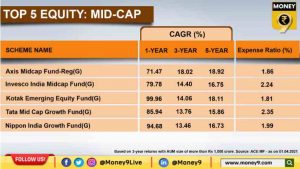These five mutual funds gave a return of over 70% in a year
Over five years, these funds have given returns of between 15-19%

Midcap stocks have been a hot favourite of investors in the past one year. The Nifty Midcap index has rallied 102% compared to the Nifty 50 index, which has surged 71.13%. But investing directly in midcap stocks is not for everyone.
It requires in-depth knowledge of stock picking and understanding business models and financial statements. If you are someone who lacks such skills, don’t be disappointed. You can still enjoy returns generated by midcap stocks by investing in midcap equity mutual funds.
Midcap equity funds
Midcap funds funds invest in mid-sized companies. According to the norms, companies that are ranked from 101 onwards till 250 based on their market capitalisation are categorised as midcap companies. Midcap mutual funds invest a minimum of 65% of their total assets in equity and equity-related instruments of mid-cap companies.
These funds invest in the midcap companies with higher growth potential but don’t exhibit risks associated with small caps since these companies have attained a certain scale and stability. Midcap mutual funds offer higher returns than large caps without being risky like smallcap funds.
Understanding the risks
Midcap equity funds are highly volatile in nature when compared to large-cap funds. They carry huge market risks, although they deliver exceptional profits. Understand the basic financial rule higher the returns higher the risks. If you have a high-risk appetite, you may invest in mid-cap funds. Weigh your financial goals and risk appetite before making a decision. Invest in mid-cap equity funds if the market volatility does not affect you much and you plan to remain invested for long.
Investment horizon
Midcap funds offer great compounding benefits to investors. However, compounding requires time and these funds are volatile. They invest in mid-cap companies that are in the growth phase. Hence, it is important to have an investment horizon of over five years to benefit from investing in mid-cap companies.
Best-performing midcap schemes
Now that you have understood what exactly mid-cap equity are funds the risk associated with them and the investment horizon required for it. Let us now look at the top-five midcap equity fund schemes:

Tax implications
When you redeem the units of a Midcap Fund, you earn taxable capital gains. The rate at which you will be taxed depends on the period for which you stayed invested in the scheme — the holding period. The tax rates are as follows:
Short Term Capital Gain (STCG) – A holding period of up to one year. STCG is taxed at 15%.
Long Term Capital Gain (LTCG) – A holding period of more than one year. There is no tax on LTCG of up to Rs 1 lakh. Above this amount, LTCG is taxed at the rate of 10% without the benefit of indexation.
(Disclaimer: The above list is for informational purpose only. Before investing, please consult your financial adviser)

